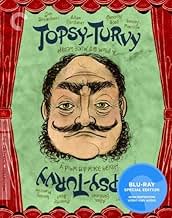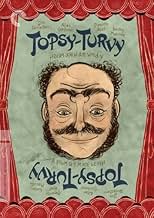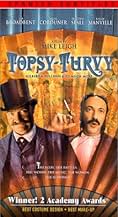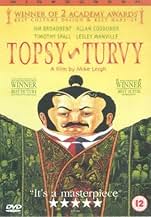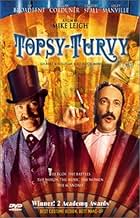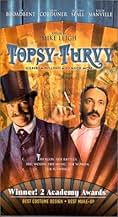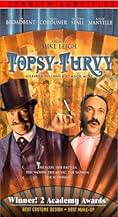Topsy-Turvy
- 1999
- Tous publics
- 2h 40m
IMDb RATING
7.3/10
14K
YOUR RATING
Set in the 1880s, chronicles how during a creative dry spell, the partnership of the legendary musical/theatrical writers Gilbert and Sullivan almost dissolves, before they turn it all aroun... Read allSet in the 1880s, chronicles how during a creative dry spell, the partnership of the legendary musical/theatrical writers Gilbert and Sullivan almost dissolves, before they turn it all around and write the Mikado.Set in the 1880s, chronicles how during a creative dry spell, the partnership of the legendary musical/theatrical writers Gilbert and Sullivan almost dissolves, before they turn it all around and write the Mikado.
- Won 2 Oscars
- 13 wins & 28 nominations total
Bill Neenan
- Cook
- (as William Neenan)
- Director
- Writer
- All cast & crew
- Production, box office & more at IMDbPro
Featured reviews
Much has been said here regarding the brilliant costumes, art direction and acting. The one thing I would like to point out is the misconception many have had about the script itself.
Several comments here have claimed that the film is "clunky" in that several scenes apparently added nothing to the film. They also said there was no character development. I think these people need to realize that the depth they seek is contained in the very scenes they wished excised. Which show us all of the different aspects of these characters' lives.
While appearing to be unimportant, empty or simple these many scenes reveal incalculable depth and character insight. The rehearsal scene for just one example, while seeming initially to be a little comedic scene shows us the nature and attitude of both the author and the actors involved in their creative processes.
The performance scenes are also not superfluous as some have wrongly asserted. We can see the characters we have come to know and how they deal onstage with the problems we know they have in their lives: through expressing themselves in their art!!!
In addition the scenes are not arbitrarily strung together but all contain a subtle cause and effect throughline. Sometimes these are reversed as when a cause is revealed only after we have repeatedly seen the effect (as in the revelation of Grossman's illness). Many of the scenes which people have called "tacked on" at the end (like the stunning scene between Gilbert and his wife Kitty) are in fact set up in the earlier parts of the film if you pay close attention and are in actuality a natural progression of these relationships.
Even the very last scene when the leading lady sings is there to show us her identification with the song she is singing and therefore an indirect relationship with her lyricist and composer. This film needs to be seen more than once to appreciate how well constructed it truly is
Several comments here have claimed that the film is "clunky" in that several scenes apparently added nothing to the film. They also said there was no character development. I think these people need to realize that the depth they seek is contained in the very scenes they wished excised. Which show us all of the different aspects of these characters' lives.
While appearing to be unimportant, empty or simple these many scenes reveal incalculable depth and character insight. The rehearsal scene for just one example, while seeming initially to be a little comedic scene shows us the nature and attitude of both the author and the actors involved in their creative processes.
The performance scenes are also not superfluous as some have wrongly asserted. We can see the characters we have come to know and how they deal onstage with the problems we know they have in their lives: through expressing themselves in their art!!!
In addition the scenes are not arbitrarily strung together but all contain a subtle cause and effect throughline. Sometimes these are reversed as when a cause is revealed only after we have repeatedly seen the effect (as in the revelation of Grossman's illness). Many of the scenes which people have called "tacked on" at the end (like the stunning scene between Gilbert and his wife Kitty) are in fact set up in the earlier parts of the film if you pay close attention and are in actuality a natural progression of these relationships.
Even the very last scene when the leading lady sings is there to show us her identification with the song she is singing and therefore an indirect relationship with her lyricist and composer. This film needs to be seen more than once to appreciate how well constructed it truly is
Not being a big fan of opera (of the comedic variety or otherwise), I chose to watch this movie as a period piece, hoping to see a lot of eccentric characters putting on even more eccentric theatre. That was easy, since the trailer for the film points in that direction entirely.
What I didn't expect was a thoroughly entrancing inside view of the Victorian theatre. Not to mention comprehensive. Everyone is covered in this - from the stage boy through the chorus through the leads and producers and assistant directors. The telling of the complex relationships between the directors (Gilbert and Sullivan) and the leads is particularly poignant - whether dealing with the actors' considerable egos or their individual popularity among the chorus, nothing presented doesn't ring true.
I loved everything about this movie. It's a great story, told wonderfully by all involved. It is truly a film of much love and craft.
And I expect I'll be attending the next run of the Mikado next time it comes to town.
What I didn't expect was a thoroughly entrancing inside view of the Victorian theatre. Not to mention comprehensive. Everyone is covered in this - from the stage boy through the chorus through the leads and producers and assistant directors. The telling of the complex relationships between the directors (Gilbert and Sullivan) and the leads is particularly poignant - whether dealing with the actors' considerable egos or their individual popularity among the chorus, nothing presented doesn't ring true.
I loved everything about this movie. It's a great story, told wonderfully by all involved. It is truly a film of much love and craft.
And I expect I'll be attending the next run of the Mikado next time it comes to town.
I am a violinist who has done a lot of theater shows and have seen lots of theater rehearsal.
For me this film has everything - the scenery is more lavish and beautiful than I've ever witnessed anywhere. For me, the interest _is_ the behind-the-scenes view of the actors. The fact that Allan Corduner (Sullivan) is actually a musician (not just miming the piano work) is a real plus. The scene of the recital of his "Lost Chord" was a marvelous musical moment. It captured the atmosphere of an old-style home recital, with earnest artists and elegant surroundings. And the rehearsal scene with the trio Grossmith (Koko), Barrington (Poo-bah), and Beauville each singing why they can't chop their own heads off is a marvelous view of what rehearsal can and should be like. Everyone has learned their words but now we're refining the artistry. The director assumes the viewer is well versed and doesn't beat him over the head. I feel honored that I am being treated as an intelligent watcher. When Gilbert says to Beauville, "I've gone to great length to give you triplets..... so let's do it again and let's ....'trip'", and they do, and it really works, I get the feeling that they live in and understand my world. Every moment of the film has for me a beauty.
The snippets of the other G&S operettas are astounding. The wake-up scene in The Sorcerer is probably only a minute long, but each word and glance is well chosen, and everyone is in perfect character. Like the cliché, "Every bride is beautiful.", every man and woman in this cast is beautiful.
Another remarkable moment in the film is Temple's "Mikado Song" when he dances, and the aftermath where Gilbert cuts the number and it then gets reinstated by the chorus men and women cornering Gilbert in the stairwell. My experience is that people in theater really do care for each other and they wish each other well. When someone does something of artistic merit, they know it, and want it to be displayed.
Almost every moment of this film rings true to me as a musician, and I treasure it. I can start this video at any random spot on the tape and find something to enjoy for 10 seconds or for another hour.
Because much of the film centers around Mikado, anyone who has ever worked on Mikado as an actor, crew, or musician will find much to enjoy. For someone who is not at all familiar with that operetta, I could understand them feeling that they can't see the continuity-- because the director has chosen not to repeat things. You will see this part and that part in preliminary stages of rehearsal but not again later, so if you saw the behind the scenes work, you won't see the 'finished product' except in the case of "Three Little Maids."
I was left wishing that this cast actually had created a full length version of Mikado, but alas I don't believe they did; all this work was for the sake of this film and it's not a documentary of an actual living repertory group.
For me this film has everything - the scenery is more lavish and beautiful than I've ever witnessed anywhere. For me, the interest _is_ the behind-the-scenes view of the actors. The fact that Allan Corduner (Sullivan) is actually a musician (not just miming the piano work) is a real plus. The scene of the recital of his "Lost Chord" was a marvelous musical moment. It captured the atmosphere of an old-style home recital, with earnest artists and elegant surroundings. And the rehearsal scene with the trio Grossmith (Koko), Barrington (Poo-bah), and Beauville each singing why they can't chop their own heads off is a marvelous view of what rehearsal can and should be like. Everyone has learned their words but now we're refining the artistry. The director assumes the viewer is well versed and doesn't beat him over the head. I feel honored that I am being treated as an intelligent watcher. When Gilbert says to Beauville, "I've gone to great length to give you triplets..... so let's do it again and let's ....'trip'", and they do, and it really works, I get the feeling that they live in and understand my world. Every moment of the film has for me a beauty.
The snippets of the other G&S operettas are astounding. The wake-up scene in The Sorcerer is probably only a minute long, but each word and glance is well chosen, and everyone is in perfect character. Like the cliché, "Every bride is beautiful.", every man and woman in this cast is beautiful.
Another remarkable moment in the film is Temple's "Mikado Song" when he dances, and the aftermath where Gilbert cuts the number and it then gets reinstated by the chorus men and women cornering Gilbert in the stairwell. My experience is that people in theater really do care for each other and they wish each other well. When someone does something of artistic merit, they know it, and want it to be displayed.
Almost every moment of this film rings true to me as a musician, and I treasure it. I can start this video at any random spot on the tape and find something to enjoy for 10 seconds or for another hour.
Because much of the film centers around Mikado, anyone who has ever worked on Mikado as an actor, crew, or musician will find much to enjoy. For someone who is not at all familiar with that operetta, I could understand them feeling that they can't see the continuity-- because the director has chosen not to repeat things. You will see this part and that part in preliminary stages of rehearsal but not again later, so if you saw the behind the scenes work, you won't see the 'finished product' except in the case of "Three Little Maids."
I was left wishing that this cast actually had created a full length version of Mikado, but alas I don't believe they did; all this work was for the sake of this film and it's not a documentary of an actual living repertory group.
10Fab4Fan
TOPSY-TURVY, director Leigh's spectacularly entertaining look at the lives and times of the nineteenth-century British duo that gave the world such musical treasures as The Pirates of Penzance and HMS Pinafore. Leigh's film finds G & S in 1884 at a creative impasse following the disappointing reception of their new flop operetta, Princess Ida. Sullivan (Allan Corduner), tired of writing music for the increasingly trite and repetitive librettos of Gilbert (Jim Broadbent), wants to give up their lucrative partnership and write "serious" grand opera. But when an exhibition of Japanese art and culture travelling through London inspires Gilbert to begin writing The Mikado, both men see the opportunity to create something unique and extraordinary. Praise for this stunning film must extend from top to bottom, beginning to end. The music, of course, is wonderful and ever present. The costumes, sets and cinematography are exemplary in their attention to atmosphere and detail. Leigh's script and direction not only bring the period to life, but make it crackle with drama, wit, and social comment. And the performances are fabulous, notably the magnificent Broadbent as mercurial Gilbert; Corduner, warm and charming as the more sweet-natured Sullivan; and Leigh regular Timothy Spall (SECRETS & LIES) as a veteran actor fearful that his big number may be cut. This is quite simply one of the most vastly entertaining, joyous and fascinating films ever made about the creative process. I actually saw it twice within a three-day period and wasn't bored for one second of either viewing!
10markt-9
I loved this film, yet I have a hard time understanding many of the comments other viewers have made. I never liked G&S all that much, thought they were rather light weight stuff. Never liked the late Victorian era much either. Kind of a dull time, I thought. Musicals are definitely not my thing.
Yet this movie struck me as one of the greatest I have ever seen, right up there with Greed and Citizen Kane and all that lot. I suppose it's because I like period pieces, and I think it's damned difficult for anyone to draw an accurate -- or even an evocative -- picture of any time that is not their own. This movie does that, and it never even appears to strain so much as a single hair to do so.
In the end, this movie is deeply *humane.* Like many another Mike Leigh epic, the characters here are drawn in the round, flaws and talents all on view, just like real human beings. And he likes them all, even the stinkers. Likes them well enough to paint them as they are, not as cardboard figures.
If you like your characters pre-digested and redrawn larger than life and your plots full of twists and turns, you might find this movie tame. If you like people, you'll find it fascinating, funny, and true as gold.
And why do I rate it so highly? Because it hangs together so perfectly, all of a piece. It's luscious to look at, delightful to hear, and sweet as candy without ever once becoming saccharine or cheap.
Some reviewers complained you had to "already know" something to enjoy this movie: the music, the time, the language, the whatever. I say, all you have to know is human beings. If you find them interesting, you'll love this movie.
Yet this movie struck me as one of the greatest I have ever seen, right up there with Greed and Citizen Kane and all that lot. I suppose it's because I like period pieces, and I think it's damned difficult for anyone to draw an accurate -- or even an evocative -- picture of any time that is not their own. This movie does that, and it never even appears to strain so much as a single hair to do so.
In the end, this movie is deeply *humane.* Like many another Mike Leigh epic, the characters here are drawn in the round, flaws and talents all on view, just like real human beings. And he likes them all, even the stinkers. Likes them well enough to paint them as they are, not as cardboard figures.
If you like your characters pre-digested and redrawn larger than life and your plots full of twists and turns, you might find this movie tame. If you like people, you'll find it fascinating, funny, and true as gold.
And why do I rate it so highly? Because it hangs together so perfectly, all of a piece. It's luscious to look at, delightful to hear, and sweet as candy without ever once becoming saccharine or cheap.
Some reviewers complained you had to "already know" something to enjoy this movie: the music, the time, the language, the whatever. I say, all you have to know is human beings. If you find them interesting, you'll love this movie.
Did you know
- TriviaNot only did all the actors do their own singing, but everyone in the cast, including the pit orchestra and the actors who play instruments in the film, actually played the music they are seen to play.
- GoofsThis well known quote from the film is a factual mistake: "If you wish to write a Grand Opera about a prostitute, dying of consumption in a garret, I suggest you contact Mr Ibsen in Oslo. I am sure he will be able to furnish you with something suitably dull". The city of Oslo got the name in 1925 - a long time after Ibsen's death in 1906. During Ibsen's lifetime, the capital of Norway was called Kristiania.
- Quotes
Helen Lenoir: The more I see of men, the more I admire dogs.
- Crazy creditsThe credit for "Location Vehicles" is misspelled "Location Vechicles".
- SoundtracksIf You Give Me Your Attention
from "Princess Ida"
Music by Arthur Sullivan
Lyrics by W.S. Gilbert
Performed by Martin Savage and Chorus
- How long is Topsy-Turvy?Powered by Alexa
Details
- Release date
- Countries of origin
- Languages
- Also known as
- Mike Leigh Untitled
- Filming locations
- Richmond Theatre, 1 Little Green, Richmond, Greater London, England, UK(Savoy Theatre, London, England, UK)
- Production companies
- See more company credits at IMDbPro
Box office
- Budget
- £10,000,000 (estimated)
- Gross US & Canada
- $6,208,548
- Opening weekend US & Canada
- $31,387
- Dec 19, 1999
- Gross worldwide
- $7,804,439
- Runtime2 hours 40 minutes
- Color
- Sound mix
- Aspect ratio
- 1.66 : 1
Contribute to this page
Suggest an edit or add missing content




